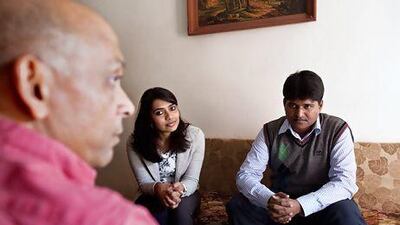NEW DELHI // Deepak Puri, who lives in San Franciso, spent a year fretting about his elderly parents who live in India. Now in their 80s, Mr Puri's parents needed someone to check in on them at their home in New Delhi.
From helping with doctor appointments, to monitoring home care, "the spectrum of things they needed help with was turning into a long list", said Mr Puri, a software entrepreneur, during a visit to India.
"There are not many agencies who do in-house care, and I had a hard time finding one," he said.
Mr Puri, 54, is one of a growing number of Indian expatriates seeking help from a small number of companies that provide home-based services for their parents.D
To a large extent, this reflects cultural attitudes. Indians view families who send their senior family members and relatives to retirement homes, or who hire help at home, as being failures, say experts. But a changing demographic means that a cultural shift is under way.
According to the 2011 census, India has 100 million people over the age of 65, a number second only to China. While this accounts for only 8 per cent of the population, the number is expected to double by 2040.
Mr Puri found a solution when he chanced upon a service called Epoch Eldercare, which provides care at home. Kabir Chadha, 26, founded the company in January and has more than 40 clients in Delhi with most of his clients Indians whose children live abroad. "Expectations and values are changing, people in their 20s are not going to take care of the elderly in the same way that a 40-year-old might," Mr Chadha said. "Fewer and fewer people are willing to shoulder the burden."
Dr Seema Puri, an associate professor at the Institute of Home Economics at the University of Delhi, said the market seniors' care is about five years old. She estimates there are less than 10 such companies in India.
"Earlier the care was given by the family but, with children moving away and the breakdown of larger families and also the pressures of a job, even on the women of families, there is no time to care for the elderly," said Dr Puri. "It is very difficult for working families to find time for them and the elderly are left alone. Now more than ever, it is important for paid care. The elderly, they just want to be heard."
Bhanu Prakash, a psychologist with Epoch Eldercare, visits the Puri home three times a week. He spends an hour with them and helps with bills that need to be paid, reads the newspapers and discusses current events and makes sure the medical appointments are scheduled.
"I provide companionship in a way that is respectful," Mr Prakash said. "Addressing Indian elders' needs is a complex issue because of our culture."
Mr Puri's father, Jagan Nath, 84, will undergo a cataract operation this week while his mother, Kailash, 81, is scheduled for knee-replacement surgery soon. And Mr Prakash will help after having won over the Puris.
"My parents were reluctant, to some extent sceptical," Mr Puri said. "They didn't see value in someone, a stranger, visiting them a few times a week. To them if someone comes and cooks for them then it is tangible, but if someone is chatting with them, then they wanted to know, 'where is the value in that,'"
The Puris' attitude was representative of most Indians, Mr Chadha said. "You are considered a failure, it is a shame, if you cannot look after your folks."
But Mr Chadha knows first hand, from living with his grandmother, how complicated the issue can get. After moving back to India from New York in 2011, Mr Chadha found it difficult to provide care for his ailing grandmother, who is in her 80s. His parents live in Dubai.
"I knew from my parents' experience that they had a really hard time providing quality care for her. Despite having adequate resources, it was still hard."
And Mr Chadha is confident that the demand for his services will only increase. Where once relatives and family friends rallied around the elderly, now, especially in the cities, they find themselves alone.
"Without human interaction, you just sit around all day," Mr Chadha said. "Even the sick, when they go to a doctor, the first thing they are looking for is a human touch."
Hari Mohan Saxena, 81, a retired pathologist, and his wife, Usha, 78, a paediatrician, have three children. All of them live abroad and recently joined Mr Chadha's list of clients.
Unlike Mr Puri, who went back and forth with his parents before introducing them to a healthcare worker at home, the Saxenas were given little prior notice of the impending visit. One of Dr Saxena's daughters, who lives in the United States, called him five weeks ago and "informed us all of a sudden that someone is going to stop by".
"They [his children] probably thought we are alone here, nobody is there to take care of us and we need social interaction," Dr Saxena said.
"Later on we realised the background to the visit and were surprised," Dr Saxena said. "But it has been a good experience and I really enjoy the social interaction."

